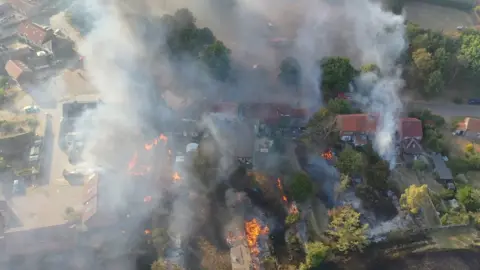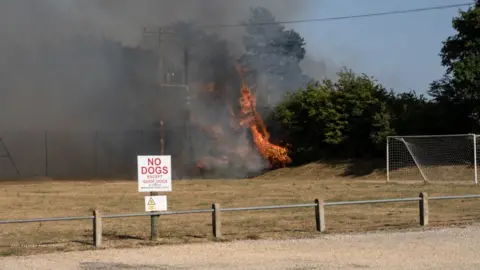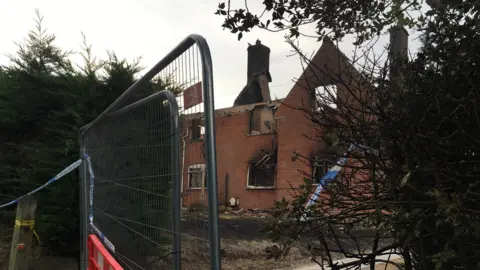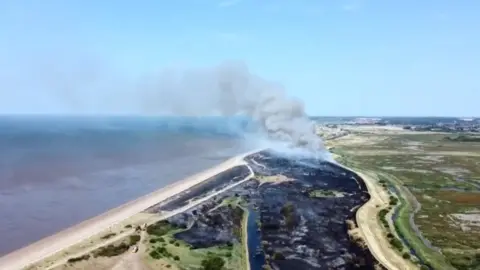Norfolk fire service says it is 'better able' to tackle spate of wildfires
 Pink Spitfire Aerial Photography
Pink Spitfire Aerial PhotographyA fire service called to 100 wild fires on last year's hottest day says is "better placed" today to deal with a similar heatwave emergency.
A major incident was declared in Norfolk a year ago today as the county faced in temperatures of 39C (102F).
Emyr Gough, of Norfolk Fire and Rescue Service, said: "It was the busiest day we have ever had".
He said "without doubt" the service would be able to cope with a similar crisis.
Following the unprecedented level of fires, inspectors rated the fire service "inadequate" in terms of fire prevention but "good" at dealing with them.
Commenting on the anniversary of the major incident, Mr Gough, the fire service's head of prevention and protection, said the service had developed a series of strategies to cope with any similar outbreaks caused by high temperatures.
This included new equipment, more fire training, different shift patterns and better messaging to the general public, he said.
 Gary Pearson Photography
Gary Pearson Photography"As far as the learning goes, we've taken a huge amount from last year, we've changed our work priorities, particularly for the summer months," he said.
With field fires raging in Europe and the world at present, Mr Gough said "without doubt" the service was now better placed to cope with any heatwave fire emergency in Norfolk.
"Some of those measures we've put in place in the last 12 months, can be split into two groups really - procedures and staffing levels and equipment," he said.
"If an event like last year was to happen again, we would have people well-rested and they could come on and replace the firefighters who were absolutely exhausted last year.
"Some of them were working over 20 hours and we don't want that to ever happen again."

He said crews were also trialling new lightweight, cooler, fire retardant kit, to both protect fire fighters and to allow them to tackle fires for longer.
The fire authority has also invested in "more mobile and agile branches, and misting units, that use smaller amounts of water with more effect," Mr Gough said.
Access to water sources had proved an issue in tackling the field fires last year.
Mr Gough said it was now "able to access water supplies within farms, with new water supplies also being recorded on mobile data terminals on fire engines so commanders know exactly where they can get water from".
The new links with the farming community also allowed it "to help the rural-urban interface where a field meets housing".
 Andrew Turner/BBC
Andrew Turner/BBCSome 30 homes were destroyed or damaged by fire in Norfolk last year, including Keith Gant's home for 30 years in Ashmanhaugh, close to Wroxham.
He said a fire started in a field behind the house and then spread "like a bush fire" into his semi-detached home, which destroyed his home.
The fire service said communities needed to play their part and "must not give fire a chance to start or grow and develop".
"Just be sensible and cautious about the environment," he said.
 Andrew Waddison
Andrew Waddison
Follow East of England news on Facebook, Instagram and Twitter. Got a story? Email [email protected] or WhatsApp us on 0800 169 1830
